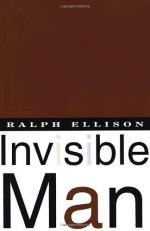|
|
Invisible Man Topic Tracking: Anger
Topic Tracking: Anger
Chapter 1
Anger 1: Anger is the catalyst for much of the action throughout Invisible Man, and as a result, it is an important theme in the novel. The first encounter with genuine anger is through the narrator's grandfather. The old man dies angry with himself for always giving in to white people and following their rules. The old man's anger at his own submission haunts the narrator.
Chapter 3
Anger 2: Mr. Norton's anger has the power to irrevocably alter the narrator's life, and he only has this power because he is white and the narrator is black. Because the young man knows the danger of Mr. Norton's anger, he is very nervous about what will happen to him when he gets back to school.
Chapter 10
Anger 3: The narrator is angry with Dr. Bledsoe for betraying him and setting him up to fail. He wants to avenge himself on Dr. Bledsoe because of it.
Chapter 11
Anger 4: Brockway is angry that the paint company has sent someone to work with him because he thinks that the narrator is trying to take over his job. The narrator is angry with Bledsoe, at his first boss at the paint factory, as well as the men in the union meeting who called him a fink. Then Brockway picks a fight with him, so the narrator beats him up.
Chapter 12
Anger 5: The narrator is so angry at Bledsoe that he doesn't think twice before dumping a spittoon on a man that he mistakes for Bledsoe at the boarding house. Because of his actions, he's kicked out of his room and forced to rent a room from Mary because he has no money and no place else to go.
Chapter 13
Anger 6: The narrator is angered by the way that white men callously throw the possessions of the old black couple into the street. Their lack of compassion sparks the crowd of black spectators to act on behalf of themselves and the old couple.
Chapter 18
Anger 7: The narrator is angry that after he's devoted himself to the Communist cause in Harlem, he's now being charged with using the cause to further his own importance. Despite his anger, he doesn't want to leave the Brotherhood, so he settles for a position dealing with women's rights until the investigation clears him of the allegations.
Chapter 22
Anger 8: The leading committee of the Brotherhood is angry with the narrator because he has acted without their instructions, and they think that he's becoming a renegade. They don't like the way that he's taking initiative instead of waiting for orders, and they have to subdue him to keep him under their control. The narrator is angry with the committee for being so slow to respond to situations in Harlem and his anger leads him to consider leaving the Brotherhood.
Chapter 23
Anger 9: The narrator is angry that the Brotherhood has decided to sacrifice the people of Harlem and their needs in order to further the Brotherhood itself. He is so furious at this idea that he decides to avenge himself and Harlem by unraveling the Brotherhood from the inside out.
Chapter 25
Anger 10: The people of Harlem are so angry over the senseless death of Tod Clifton and the way that the organizations like the Brotherhood who claim to want to help them are just ineffective. In protest or outrage, or both, the people take over Harlem, looting and destroying, to finally move it out of a state of stagnation.




